Fleeing war, finding hope
Celebrating 100 years of ministry in the name of Christ in 2020, MCC continues to meet urgent needs in the region where its work began.
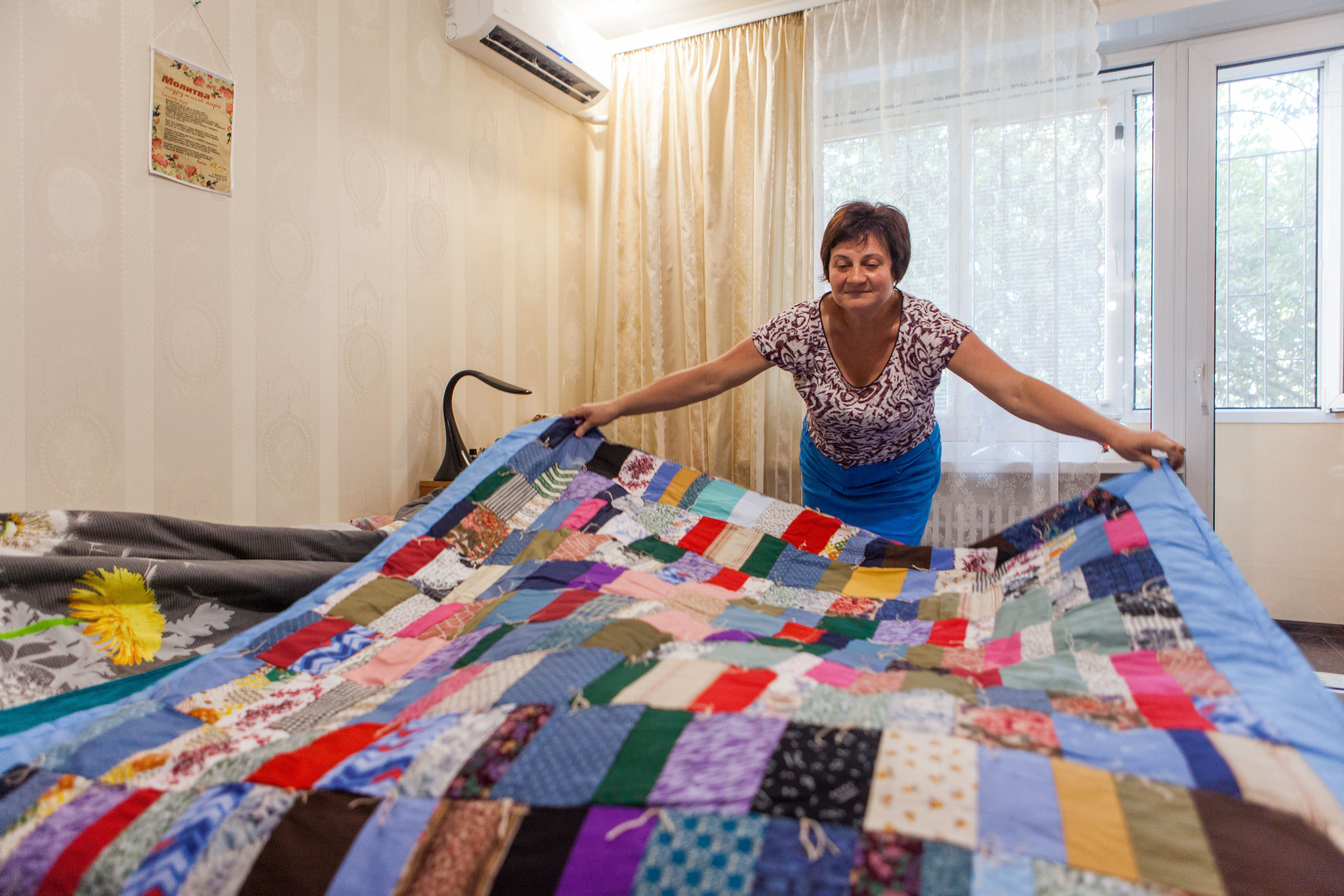
Igor and Larisa Semyonov each grab two corners of an MCC comforter, carefully center it over their blue top sheet, and let it slowly parachute down as the finishing touch of their freshly made bed. The bright fabric rectangles splash color into the cream-toned one-bedroom apartment, which overlooks the river on the outskirts of Zaporizhzhia, Ukraine.
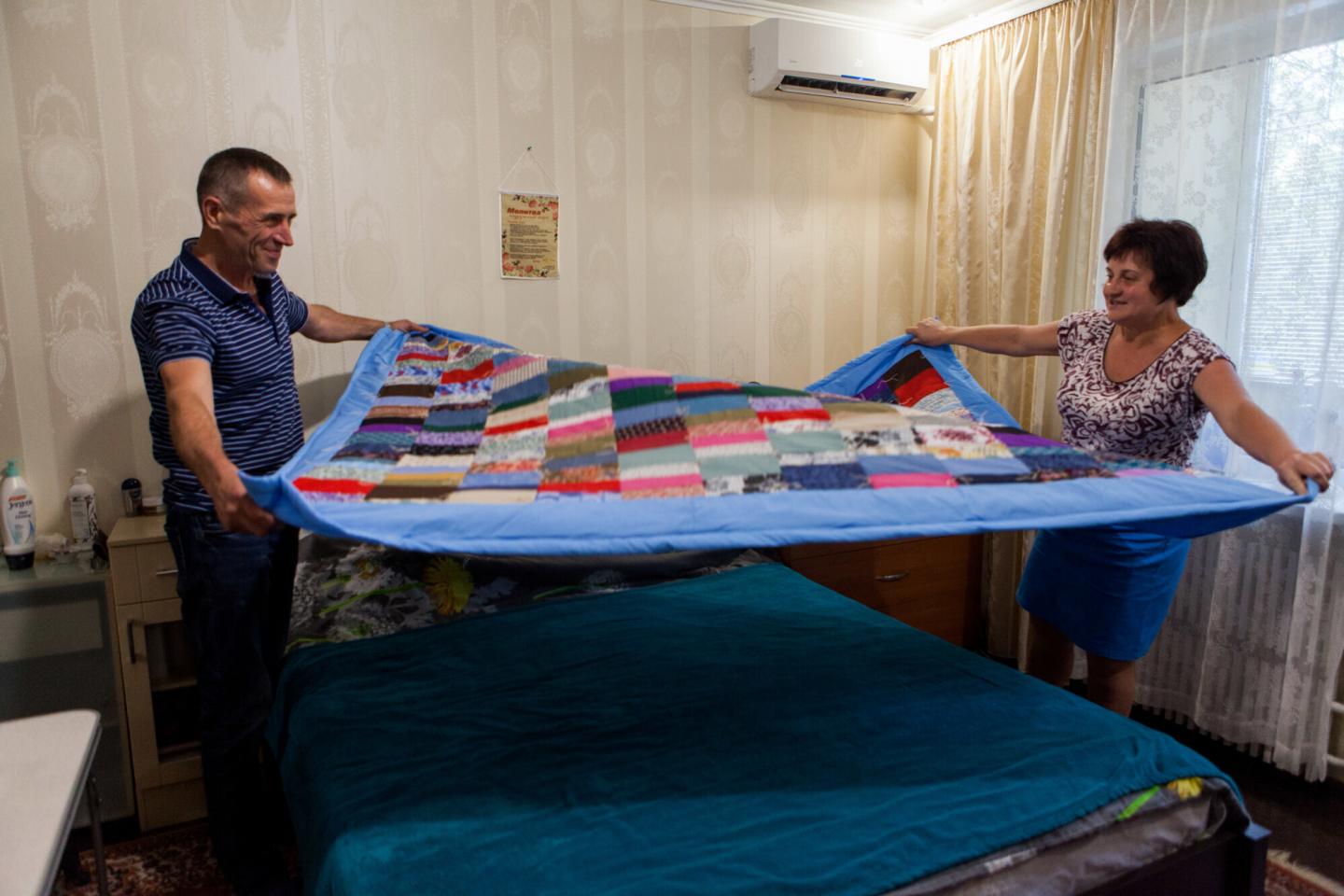
Sitting on the closet shelves are cans of meat, bearing the logo of MCC and the phrase “In the name of Christ.”
Until 2014, the couple saw themselves as the kind of people who offered relief to others, not who’d need to receive it themselves. They were happily living in the city of Donetsk, around 120 miles east of Zaporizhzhia. He had worked in prison ministry and was distributing literature for a Christian publishing company, and she worked with women in drug and alcohol rehabilitation.
Even when Igor Semyonov was diagnosed with a very aggressive form of cancer in his lymph nodes, his primary concern between treatments was when he could get back to helping people who didn’t have anyone else helping them.
But their lives were upended when the annexation of the Crimean Peninsula and accompanying protests lit the fuse on a major conflict between pro-Russian separatist and Ukrainian forces in August 2014, centered around Donetsk and consuming the Donbass region of Ukraine. Fearing for their safety, the couple decided to leave until it was safer in Donetsk.
“We were so used to everything and our life there and it was very scary to move to an unknown place with unknown things,” Igor Semyonov says. “But we left our home and moved to a place near the sea, we thought for two or three weeks.”
We were so used to everything and our life there and it was very scary to move to an unknown place with unknown things.”
Igor Semyonov
The fighting didn’t end after two or three weeks. The war in Donbass continues today, leaving 30,000 wounded, some 13,000 dead and more than 1.4 million displaced, according to the United Nations Human Rights Monitoring Mission in Ukraine.
This isn’t the first time Zaporizhzhia has served as a focal point for persecuted people. When MCC was founded in 1920 to provide food and assistance to starving Mennonites and others in the wake of the Russian Revolution, the first relief kitchens were set up in Khortitsa, a Mennonite community within the borders of the city of Alexandrovsk, today called Zaporizhzhia.Now in 2020, MCC is at work in more than 50 countries around the world. Interwoven in projects from food security and water to education and health are efforts to work for peace and justice.
And, as in 1920, a key part of MCC’s mission is to respond to the urgent needs of families facing crisis and disaster.
In Zaporizhzhia, just miles from a park with a statue memorializing Mennonites killed under Stalinist persecution, a number of MCC partner organizations are helping people whose lives are devastated by war and violence.
Igor and Larisa Semyonov found respite with one such partner, the Zaporizhzhia Baptist Union (ZBU), which offers food, shelter and other relief to people who have been forced to leave everything behind.
“For a year and a half, we lived there,” he says. “The church was really taking care of us, and after that, we became a little more independent and could rent our own place.”
At that point, he wanted to help others who had fled home, but he realized he needed more training to address the trauma of displacement that was so deeply affecting people.
Through ZBU, he reached out to MCC in Ukraine and was connected to MCC training sessions on trauma healing and care. He now volunteers, counseling displaced people in his community. It’s work he’s continued, even through a recent surgery to remove cancer from his lymph nodes, and he says nothing gives him greater joy than helping people work through and recover from trauma.
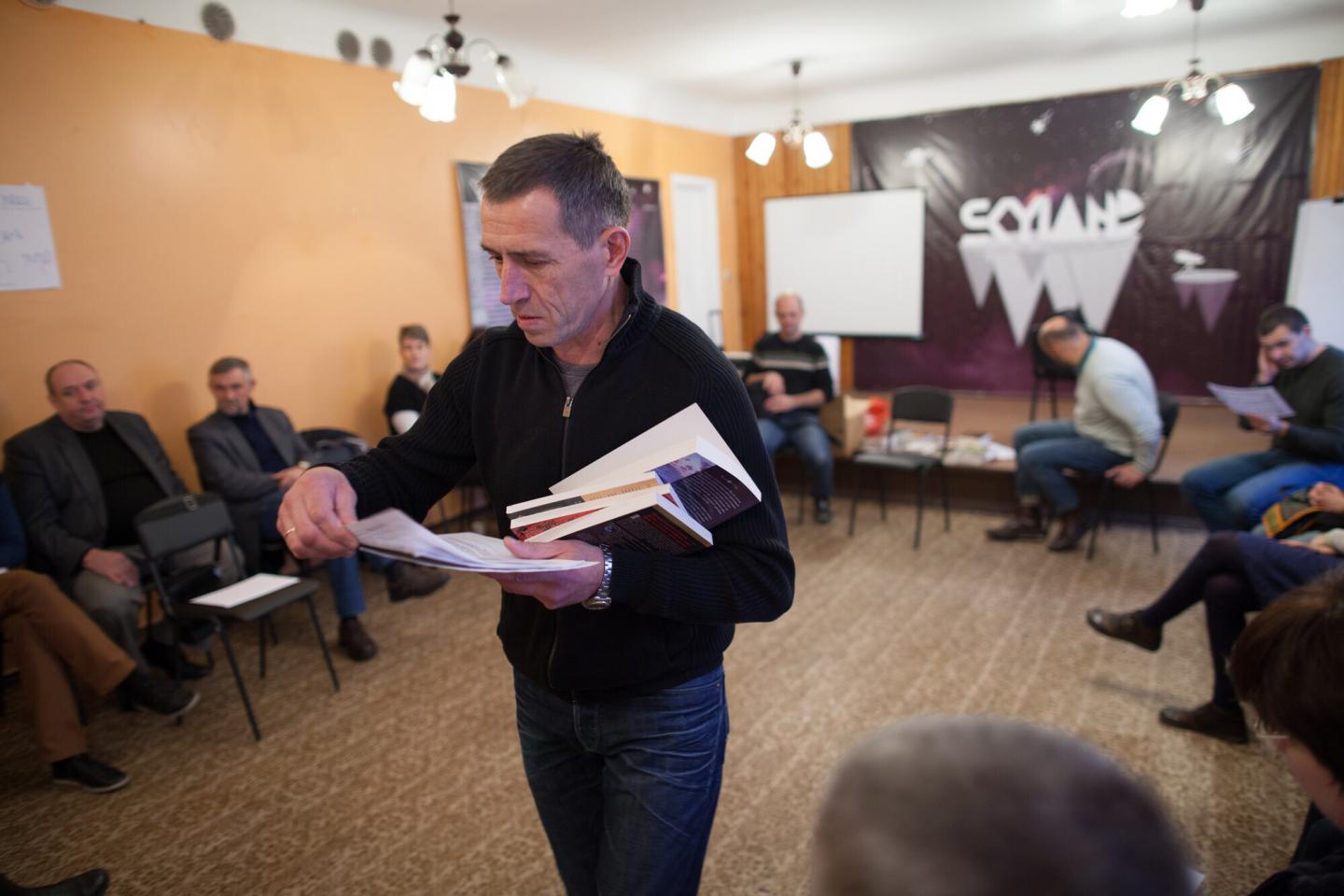
“I see the meaning of life in this and I see joy in this, and I can express myself in it,” he says. “I’m very satisfied when I can be praying for them or when I help them to get this fear out so that they can also change their lives and when I can give them this living hope in God….”
Displacement is incredibly traumatic, and one of the challenges people face after being forced from home is rebuilding their community, essential to the journey of renewing their identity and sense of self.
MCC partners — from ZBU and New Hope Center in Zaporizhzhia to New Life Charitable Fund in Nikopol — are helping.
Nina Gvozdeva and her son Danil Matsko lived in Horlivka, near Donetsk, until the war forced them to flee five years ago. They stayed in a military dormitory for three years before moving to their current home in Zaporizhzhia — a one-room apartment of some 100 square feet.
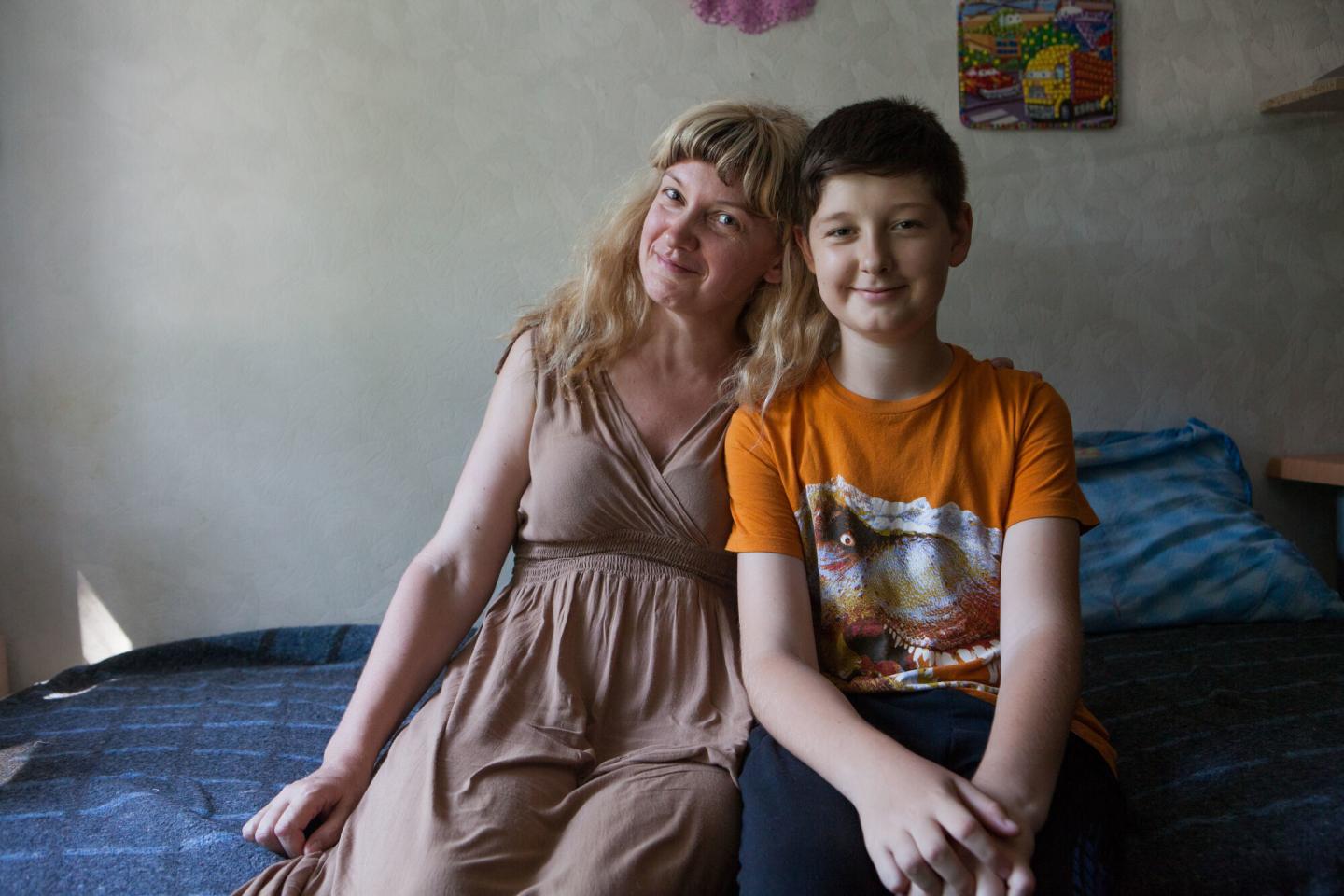
Gvozdeva says she kept telling herself it would be just a little bit longer.
For the first few weeks, every conversation was about when they’d go back to Horlivka. One day, after a few months, she wanted to lift her son’s spirits and bought him an ant farm for his desk. Then, some time after that, she hung one of his paintings, an abstract piece with a spaceship and lot of purple, near a window where the light would catch it. She’d catch herself talking about this place as “home.”
But even as she made efforts to acknowledge how her life was changing, she says it wasn’t until she heard about New Hope Center from a chance conversation that she felt truly hopeful.
“My son and I were so excited,” she says. “We just got acquainted with these people, and we were looking forward to going there every day — we were just running, running, running there.”
Through a partnership with MCC, New Hope Center, a Mennonite Brethren-initiated ministry that builds community for vulnerable children and families, offers a tutoring program to help students who struggle in school.
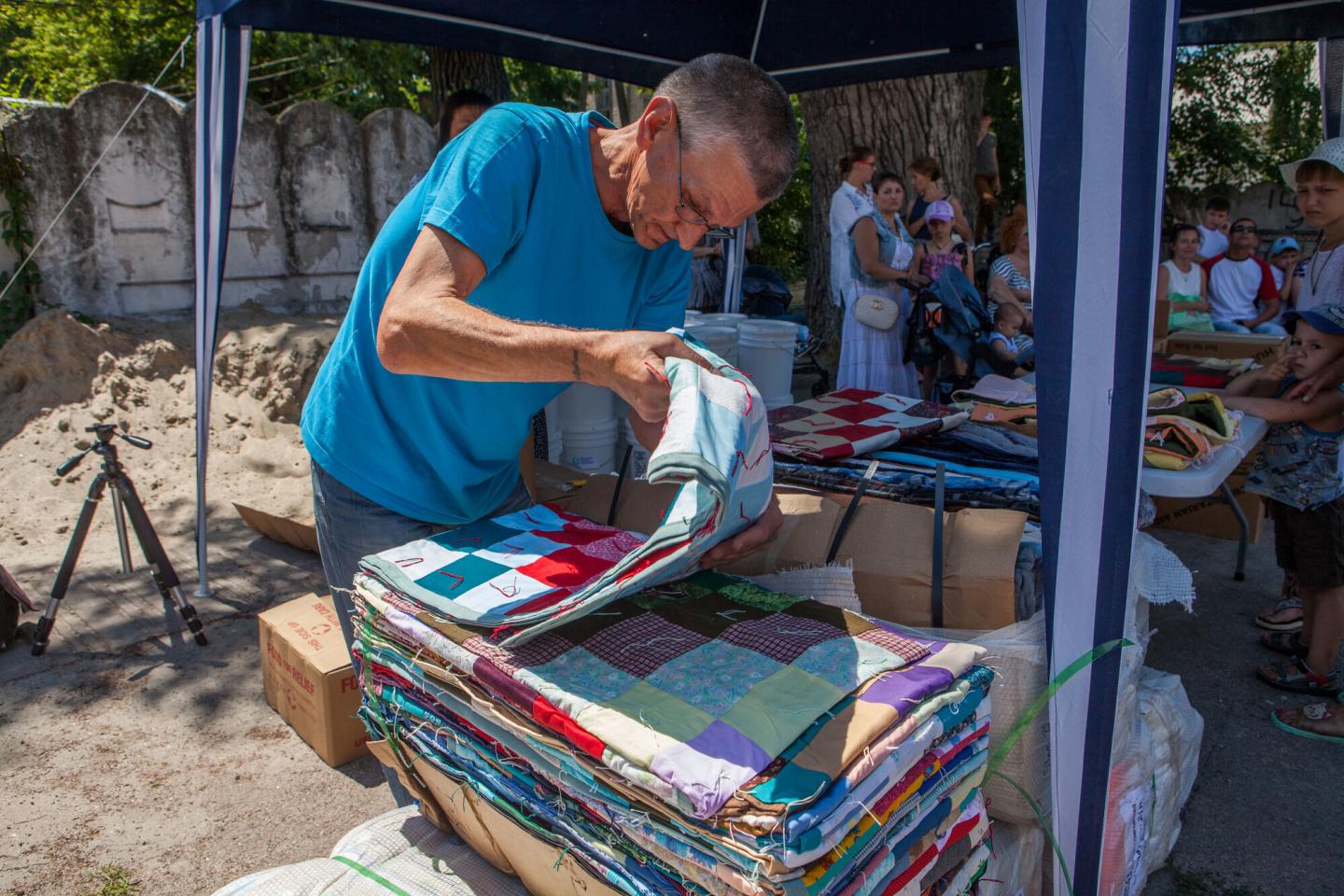
Danil, 12, says even he was surprised when tutoring helped him pass his math exam with a higher mark than he’d seen all year.
But the support that New Hope offers reaches far beyond academics. “They helped us, and Danil became more confident. He learned to communicate,” Gvozdeva says. “People there are like our friends, some men are like older brothers . . . .
Once I told someone I know that New Hope Center is like drinking water in the desert.”
Nina Gvozdeva
“Once I told someone I know that New Hope Center is like drinking water in the desert,” she says. “First, they helped us to accept all of the situation — just to live in the present, think about today. We could share about our problems and talk through it. On Sundays we go there, and they explain the Bible and I just can’t even imagine how we could live without them.”
The center’s vision is God’s restoration in all things for people — including how they see themselves and others, says Maxym Oliferovskiy, program director for New Hope Center.
“In society, there’s lots of stress that influences the families, especially because of the war here,” says Oliferovskiy. “So, in everything we do with them, we try to bring God’s peace to their souls, to their families, that they can, in return, bring this peace to other families and schools where the children study.
“And they feel it, as we share about what we do and how we interact. They call it different names, they call it ‘atmosphere,’ ‘nice,’ ‘peaceful,’ but they experience it and feel it and we’re very happy that we can increase these things in their homes.”
Jason Dueck is a writer for MCC Canada. Matthew Sawatzky is a photographer in Winnipeg, Manitoba.

